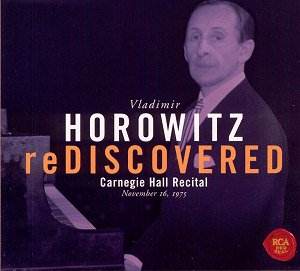As with Richter Rediscovered from the
same source, we had been in no danger of forgetting this giant
of the keyboard. All the same, the recovery of a whole Carnegie
Hall recital, recorded in 1975 complete with its group of four
encores and for many years lost in RCA’s labyrinthine vaults (the
full story is told in the booklet), is an exciting event. As a
matter of fact, the Vladimir Horowitz site on the Internet reveals
that this recital has actually circulated in a pirate version,
but I tremble to think what it sounded like. The recording quality
here is good 1970s stereo, though I doubt whether even the equipment
of today would be able to cope with the thunder of Horowitz’s
basses, the violence with which he at times draws attention to
a new musical line. Has any other pianist extracted such a wide
range of sound from the piano?
There is nothing actually new here to the Horowitz
discography, but the sheer sense of participating in an actual
recital, unedited, makes this album indispensable no matter what
other Horowitz versions you have of these pieces.
A unique mixture of tenderness and wilful impetuosity
informs Horowitz’s Schumann, teasing the little Blumenstück
into life and throwing a scorching searchlight on the teeming
textures of the "Concert sans orchestre". He truly "orchestrates"
the music, bringing a different colour and timbre to each strand,
creating an effect that is both rich and extraordinarily transparent.
This is really living dangerously, yet ultimately everything is
under control and the pianist’s wayward temperament mirrors the
composer’s own. The same nervous tension, though, renders Träumerei
a tad less convincing than some of Horowitz’s other performances.
Unfortunately, genius has its darker side. In
the second half Horowitz takes time to settle down, starting with
two Rachmaninov miniatures that are mercilessly pulled out of
shape; in the Etude-tableau he also (or so it sounds as recorded)
goes through the tone with little pity for the instrument. There
is worse to come in the 9th Etude-tableau which concludes
the encore group since he appears too tired by now even to bash
the right notes.
And yet the two Liszt pieces bring out the poet
in him, the "Valse oubliée" unhurried and tenderly
inflected, "Au Bord d’une source" relaxed and sparkling
yet quite free of gratuitous virtuosity. Chopin was another composer
who could elicit a remarkable response from Horowitz and the Valse
is notable for its truly "speaking" phrasing. But when
it comes to the Scherzo, in spite of a nicely turned central section,
I can only call a spade a spade and say that the outer sections
contain some of the most crassly insensitive piano bashing I have
ever heard. It was with gratitude and relief that I turned to
the Rubinstein recording, as I did to the plainer-speaking but
truthful Nina Milkina and Craig Sheppard in the Rachmaninov Prelude
and Etudes-tableaux respectively (but the technical quality of
Sheppard’s recording shows up poorly beside this new issue).
In the case of the Debussy "Serenade to
a Doll" Horowitz’s clarity and impish wit make a viable alternative
to Gieseking’s gentle affection, though I suspect the latter is
closer to what the composer had in mind; as for Moszkowski, this
is music which was made for a Horowitz to bring it to life.
Taken in the round, this is a unique snapshot
of one of the greatest of all pianists playing live; while other
Horowitz issues have been compiled from live performances, to
hear him unedited elsewhere you have to go to some of the last,
variable, televised concerts. The timing of the two discs may
seem ungenerous, but all praise to RCA for issuing it as it is
rather than pad it out with extraneous material. I have a dark
suspicion that it will re-enter the catalogue in a few years’
time shorn of a couple of encores to fit onto a single CD, so
get it while you can.
Christopher Howell

